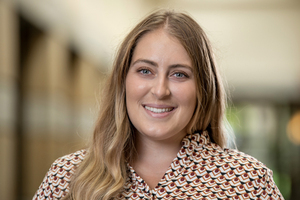
Maria Caterina (Cat) Gargano is a second-year Ph.D. student in Peace Studies and Psychology. Her interest in psychology and international human rights is what brought her to the Kroc Institute and its unique Ph.D. program. Cat sees her work at the intersection of trauma, healing, and humanitarian action, and credits her studies for helping her understand the impact of structural violence on people’s mental health. In this interview, Cat talks about her most recent research and her professional aspirations.
What brought you to the Kroc Institute and Peace Studies?
I was excited when I learned that Kroc offered the only (to my knowledge) joint Ph.D. program in Peace Studies and Psychology so that I could further integrate and explore these two interests of mine. I also really enjoyed the dynamic interdisciplinary environment at Kroc and the fact that it valued and encouraged language learning and fieldwork.
Could you describe your recent publication and research?
My research primarily focuses on mental health in the context of migration, and particularly in transit - the time between when people leave home and when they arrive at their final destination. I am also interested in exploring the relationships between various forms of violence (structural, systemic, community, temporal, spatial, intimate partner) and intergenerational mental health outcomes. Overall, the goal of my research is to inform the adaptation, design and implementation of psychosocial interventions that are culturally relevant, accessible, trauma-informed and feasible for transit contexts.
Currently, I am completing my master’s thesis, which is a mixed-methods analysis of data from a study my lab is conducting. It is entitled “Migration experiences, and women’s perceived impact of migration on their community in Lima, Perú: Associations with experiences of violence and mental health.” I also support my lab’s Pregnant Moms’ Empowerment Program Studies on intimate partner violence during pregnancy, maternal mental health,and infant development in Memphis and South Bend as well as Lima, Perú, and Monterrey, México.
In addition, I am in the process of developing two projects. The first one is a study on mental health, migration experiences, challenges and sources of resilience of people in transit, entitled La Vida en Movimiento (or Life on the Move). The second one is a project that will use audio data to assess word use and linguistic patterns associated with different mental health outcomes, with the goal of facilitating more efficient triaging and referral for mental health and psychosocial support services in contexts with resource constraints.
Why this research and these topics?
As migration policies become more stringent, more people are spending more time (often years) in transit; yet there is no adequate and clear guidance that mental health professionals can look to when making clinical decisions in this context. Research from other contexts can be difficult to implement in transit because it often focuses on the post-migration context, where social determinants of mental health are likely different; and many extant evidence-based psychosocial interventions were developed and evaluated with different populations, who have different experiences and are in different environments. Finally, people on the move may not be in the same place long enough to complete traditional treatment protocols and there is a valid concern about continuity of care.
Before coming to Notre Dame, my colleagues and I conducted a Delphi study with mental health professionals working with people on the move in ten European transit countries. We found that professionals cannot agree upon which treatments are and are not appropriate to apply in transit contexts. Actually, there was not even a consensus on if any psychological treatments should be carried out in transit at all. We found that, despite practical complications, professionals agree that more research in transit is desperately needed in order to facilitate evidence-based mental health and psychosocial support interventions for people on the move.
How do you see your peacebuilding work in the future?
I think there is a reciprocal relationship between mental health and peacebuilding - an absence of positive or negative peace can impact mental health across generations and trauma healing is an important part of peacebuilding. Many people who migrate experience some form(s) of violence before, during, and/or after migration. Even though psychology is sometimes more individually focused, I believe that designing interventions that can support each person to build and reclaim peace after experiences of violence contributes to peacebuilding overall. The understanding I have begun to develop in my peace studies classes of how various forms of structural violence, as well as how migration policies and international agreements, may impact the well-being of people on the move is key to developing interventions for transit contexts, and will shape my future research and advocacy work.
What are some fun facts about you?
I speak Spanish and Italian, and I am learning Arabic. I can also make fresh pasta and develop film.